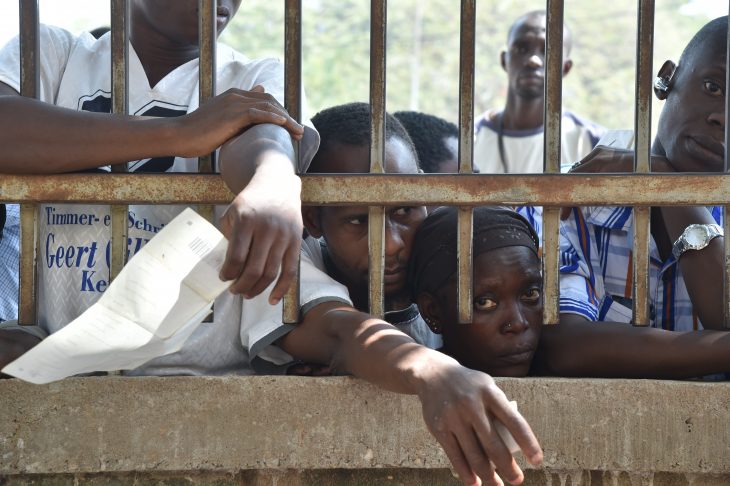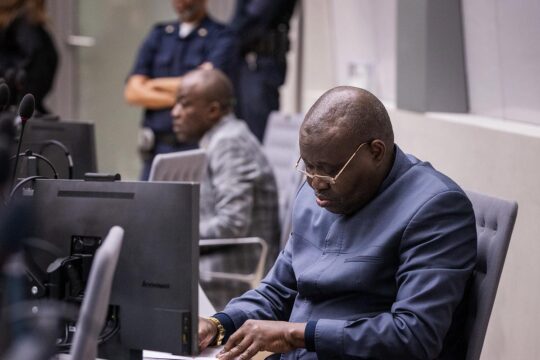Observers all agree that fighting impunity will be one of the main challenges facing the next government of the Central African Republic (CAR). The governing team that emerges from the current election process can only restore hope among Central Africans if it can provide justice in the widest sense, bring good governance and rule of law, notably by restoring the authority of the State and public institutions so they serve all citizens regardless of politics, ethnicity, religion or social class.
On January 25, the Constitutional Court approved the results of the December 30 presidential election, thus confirming an announcement by the National Elections Authority (ANE) that former prime ministers Anicet Georges Dologuélé and Faustin Archange Touadéra topped the race in the first round. They beat numerous other candidates including Martin Ziguélé, another former premier and sons of former presidents.
The second round, set for February 7, should give this former French colony a democratically elected president after a long transition marked by crimes on an unprecedented level. The CAR has been in deep crisis since President François Bozizé was ousted in March 2013 by Seleka rebels who bled the country for 10 months. The Seleka, a disparate coalition that was hard to control, in turn lost power as transition president Michel Djotodia was forced to step down under international pressure on January 10, 2014.
Another militia, the Anti-Balaka which started as civil defence, almost immediately started spreading more terror in the country, targeting attacks particularly at Muslims.
“Taking power by violent means, often accompanied by abuses, has been the fastest route to power in CAR," said Human Rights Watch Africa researcher Lewis Mudge on the eve of the presidential elections. “Yet none of those who have been responsible for widespread human rights violations have ever faced prosecution."
Setting up the Special Court
The government that will be headed either by economist Dologuélé or mathematician Touadéra will inherit a country with no police worthy of its name and a justice system that is on its knees while perpetrators of serious crimes circulate freely around the country and abroad. The new CAR will need an independent justice system capable of prosecuting the criminals, whether they be Anti-Balaka or ex-Seleka, Christians or Muslims, wherever they are in the country. To do that the new government should be able to count on a new Special Court with both national and international judges. This Court was approved by the transition government of Catherine Samba-Panza to try serious international crimes committed since 2003. However, it is not yet operational, for lack of financial and logistical means. The seriousness of the next government will be decisive in convincing international donors to provide the necessary financial and technical support to make the Court operational. “The effective operationalization of the court will only be possible if the Central African authorities have the means and opportunity to assume full ownership over it and take increased leadership in establishing it,” human rights organizations including Amnesty International said in December.
Lewis Mudge of HRW said that “the new government will also need to cooperate closely with the International Criminal Court, whom the transition government requested to start a second investigation in September 2014”.
“The fight against impunity for grave crimes committed in the Central African Republic, as well as cooperation with the International Criminal Court (ICC), must stay firmly on the agenda of the future government and of international partners who support peace and the rule of law in the country,” the Amnesty statement added.
This concern was also expressed during the National Forum held in Bangui on May 11, 2015, in the presence of international mediators and observers. The Republican Pact for Peace, Reconciliation and Reconstruction that came out of the Forum “stresses the need to prosecute the perpetrators of crimes in the Central African Republic and to cooperate for this purpose with the investigations and judicial procedures to be carried out by the Special Court, other national courts and the International Criminal Court”.
Candidates make promises
Since the transition government failed to do so, this task will fall to the next government. During the campaign for the first round of presidential polls, both the candidates still in the running promised a new Central African Republic based on respect for life and human dignity. Touadéra said he was committed to a justice system “free from all political pressures and with enough means to uphold real rule of law, so as to strengthen social cohesion. Dologuélé said in an interview with Jeune Afrique that “all those who have committed serious crimes on a wide scale must be held responsible before a Central African or international court”. History will judge the one who wins by his deeds.
In addition to classic judicial procedures, the transitional justice process should also include disarmament and reintegration of combatants, reform of the police and other security forces. Any rearming of the national army (FACA) should, as recommended by HRW expert Lewis Mudge, “take into account the serious human-rights abuses some soldiers and their commanders may have committed during the violence in recent years”. And finally, justice will not mean much if conditions are not created for the return of half a million mainly Muslim refugees and displaced persons.







